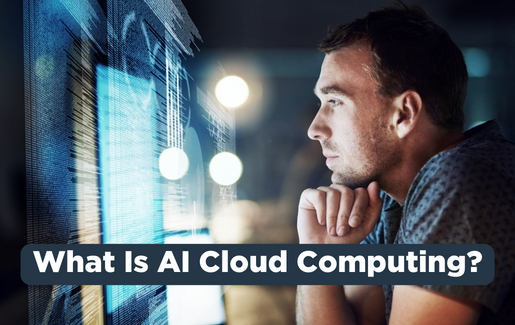What Is AI Cloud Computing?

A marriage between the two means that organizations will be able to enhance business operations, drive efficiencies and make more strategic, data-driven decisions. Let’s dive into the benefits and challenges of AI and cloud computing and take a look at what the future is likely to bring.
Importance of AI in Cloud ComputingAI and cloud computing are an ideal match. An enormous amount of data is needed to train AI models and the cloud provides access to vast datasets, making the two a perfect combination. The power needed to extract insights from large amounts of data (often found in serverless computing) can also be difficult to come by, but suddenly becomes easily accessible with the cloud.
The meshing of AI technology with cloud environments is creating possibilities for organizations of all sizes. Before the two came together, organizations without massive amounts of processing power were not able to leverage AI applications, but the cloud opens up those possibilities to SMBs and startups, empowering all organizations to leverage the potential of AI.
Pros and Cons of AI in Cloud ComputingUsing AI and cloud computing in tandem can provide many benefits for businesses, but there are also some issues we’ve yet to overcome. Some common business applications for AI in cloud computing include chatbots, IoT, AI as a service, cognitive computing, business intelligence, predictive analytics, supply chain optimization and process improvement. There are multiple pros and cons to employing all of this emerging technology in the cloud.
The pros of using AI in cloud computing include:
The cons of using cloud technology and AI together include:
AI Adoption Challenges in Cloud EnvironmentsAI and cloud computing have great potential as partners, but the union comes with a fair share of challenges.
Cloud Delivery ModelsMany organizations are moving toward hybrid cloud or multi-cloud environments. The cloud has made so many types of as-a-service offerings available to businesses that you can outsource nearly any type of support. However, most offerings are a subcategory of the following three models:
The primary challenge with implementing AI when it comes to these various delivery models involves data integration. Ensuring data is available across a multi-cloud or hybrid setup can be complex and a hindrance to properly deploying AI. You’ll need a clear flow of data from one delivery model to another so that AI can harness the insights within your data. This is often cumbersome and frequently involves overwhelming complexity to achieve.
Cloud TechnologiesSome cloud technologies have limitations when it comes to managing AI and machine learning workloads. Containers work on the cloud by segmenting everything needed for an application to run into a single package. Kubernetes, also known as K8, is one of the most widely used cloud technologies. Kubernetes is an open-source platform that allows you to manage those containers. Although it offers many benefits, Kubernetes is a highly complex tool that requires expansive knowledge to troubleshoot. Additionally, if your system hasn’t been designed with a cloud-native mindset, the underlying layers may not operate correctly, making your AI applications obsolete.
Skills GapsDeploying AI in the cloud requires multiple skill sets to marry all of the different functionalities together. To make it operate as expected, organizations need skill sets in cloud, data science and security with specialized knowledge needed for different platforms and tools. CompTIA’s State of the Tech Workforce 2023 reports that data scientist and data analyst are the top growth occupations. Cloud security is also becoming a top priority as organizations seek to protect customer data and meet compliance regulations. The talent pipeline isn’t developing skills quick enough to meet the high demand of jobs in these areas.
Future of AI in Cloud ComputingAI and cloud computing have a bright future. Continued innovations will make the two even easier to use in years to come. Here’s what you can expect to see when it comes to the future of the cloud and AI.
Rise of Hybrid and Multi-Cloud EnvironmentsIn a world driven by unique business models and specialized needs, organizations will continue to move more toward hybrid and multi-cloud environments to access tailor-made systems that are designed for specific purposes. AI applications will continue to become more flexible and translate across platforms for easier utilization regardless of environment.
Will Cloud Computing Be Replaced By AI?It’s unlikely that cloud computing will be replaced by AI. The future of artificial intelligence relies on the computing power and versatility of the cloud to turn data into action. It’ more likely that the two will continue to become more integrated and develop a highly symbiotic relationship to enable future business applications.
Ready to get started? Get the in-demand skills you need with CompTIA Cloud+. Download the exam objectives for free to see what’s covered.